How to Recognize and Support the Senior Hamster in Your Care
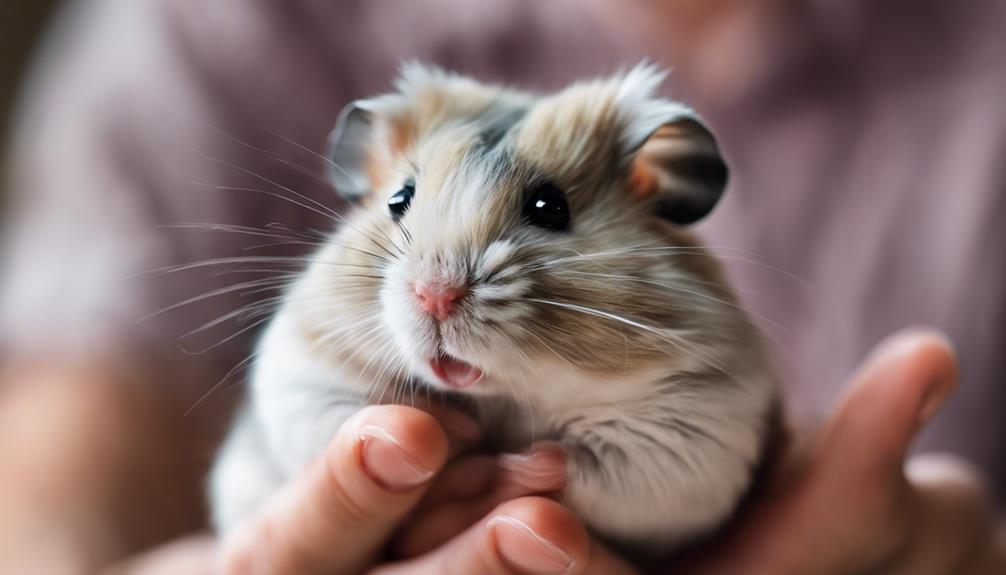
Recognizing the Signs of Aging:
- Changes in appetite and water intake
- Reduced activity levels
- Weight loss or gain
- Dental problems
Supporting Senior Hamsters:
- Providing a soft, comfortable bedding
- Ensuring easy access to food and water
- Offering a low entry point to their cage
- Regular veterinary check-ups and monitoring
Understanding the Importance of Mental Stimulation:
- Providing enrichment activities
- Rotating toys regularly
- Creating a safe play area
- Spending quality time interacting with your hamster
Signs of Aging in Hamsters
As hamsters age, they may exhibit various signs that indicate a decline in their physical and cognitive abilities. It's crucial for hamster owners to understand these signs to provide appropriate senior hamster care. Grooming tips become essential during this stage of a hamster's life, as they may struggle to groom themselves effectively. Owners should help by gently brushing their fur to prevent matting and skin issues.
Understanding hamster lifespan expectations is vital when caring for senior hamsters. Typically, hamsters live around 2-3 years, but some may live longer with proper care. As they age, hamsters may become less active, sleep more, and show a decrease in appetite. Monitoring these changes can help owners detect any potential health issues early on.
Changes in Behavior
Recognizing changes in behavior in senior hamsters is crucial for providing appropriate care and ensuring their well-being. As hamsters age, they may exhibit shifts in their usual habits and actions. Here are some essential support tips for understanding and addressing behavior changes in your aging pet:
- Be Observant: Pay close attention to your senior hamster's behavior on a daily basis. Note any deviations from their normal routines or activities.
- Provide Comfort: Create a calm and secure environment for your hamster. Offer familiar bedding, toys, and spaces to help them feel safe and relaxed.
- Adjust Handling: Senior hamsters may require gentler handling due to potential joint stiffness or frailty. Approach them with care and consider adapting your interaction style.
- Consult a Vet: If you notice significant or concerning behavior changes in your senior hamster, seek advice from a veterinarian specializing in small animals. Professional guidance can help address underlying issues and ensure your pet's well-being.
Physical Symptoms to Watch For
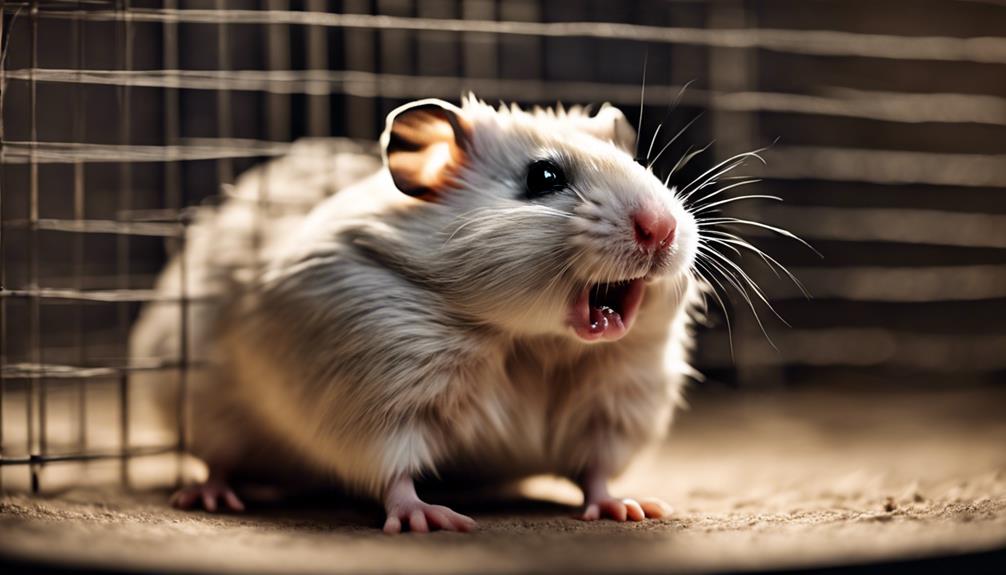
One must keenly observe senior hamsters for telltale physical symptoms indicating potential health concerns. Weight loss and lethargy are common indicators of underlying issues in aging hamsters. If you notice your hamster losing weight rapidly or becoming less active than usual, it may be a sign that something is amiss.
Additionally, hair loss can be a cause for concern in senior hamsters. Keep an eye on their coat for any thinning patches or excessive shedding. Dental issues are another aspect to watch for in aging hamsters. Difficulty eating, drooling, or a noticeable change in eating habits could all point towards dental problems that need attention.
Regularly checking your senior hamster's teeth can help catch any issues early on. By staying vigilant and addressing these physical symptoms promptly, you can ensure your senior hamster maintains a good quality of life in their golden years.
Diet and Nutrition Tips
Keen attention to dietary needs and nutrition is paramount for maintaining the health and vitality of senior hamsters. Here are some wise and authoritative tips to ensure your senior hamster is well-nourished:
- Food Preferences and Meal Times: As hamsters age, their food preferences may change. It's essential to offer a variety of fresh vegetables, fruits, and high-quality pellets. Additionally, consider providing softer food options to accommodate dental changes. Be mindful of meal times, ensuring a consistent feeding schedule to support digestive health.
- Hydration: Adequate hydration is crucial for senior hamsters. Always provide fresh water in a sipper bottle to prevent spills and contamination. Monitor water intake to ensure your hamster is staying hydrated, especially during warmer months.
- Supplements: Consult with a veterinarian to determine if your senior hamster would benefit from any specific supplements. Omega-3 fatty acids or vitamin drops may be recommended to support joint health and overall well-being.
Creating a Comfortable Environment
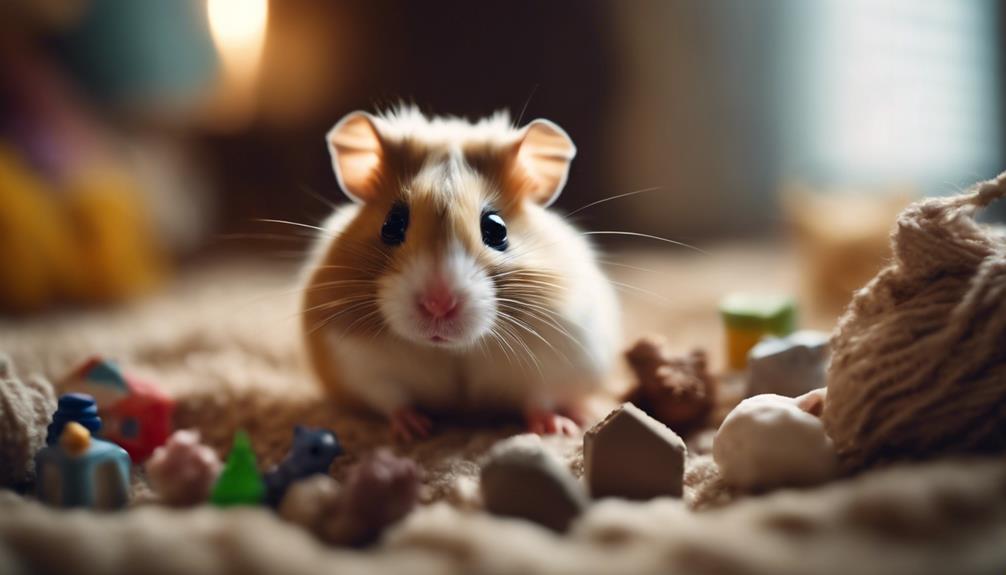
To ensure the well-being and contentment of senior hamsters, it's essential to create an environment that prioritizes their comfort and security. Enrichment activities play a crucial role in keeping senior hamsters mentally stimulated and engaged. Providing toys that encourage exploration, such as tunnels or puzzle feeders, can help prevent boredom and promote mental health. Additionally, incorporating senior-friendly accessories like soft bedding and gentle ramps can make their living space more accessible and cozy.
When setting up their habitat, it's important to consider their specific needs. Ensure that the enclosure is situated away from drafts and direct sunlight, as these can cause stress and discomfort for senior hamsters. Maintaining a consistent temperature range and keeping the area quiet can also contribute to their overall well-being.
Exercise and Mental Stimulation
In maintaining the well-being of senior hamsters, ensuring adequate exercise and mental stimulation is paramount to their overall health and happiness. To support their vitality and zest for life, consider the following:
- Toy Rotation and Enrichment: Introduce a variety of toys and regularly rotate them to keep your senior hamster engaged and mentally active. Toys like tunnels, chew toys, and puzzle feeders can provide both physical and mental stimulation.
- Interactive Playtime and Bonding: Spend quality time interacting with your senior hamster through gentle handling, supervised exploration outside the cage, or even teaching new tricks. This not only promotes mental stimulation but also strengthens the bond between you and your furry companion.
- Mindful Observation: Pay close attention to your hamster's behavior during playtime and daily activities. Notice any changes in their enthusiasm or energy levels, as this can indicate their need for new forms of mental engagement.
- Encouraging Exploration: Create safe spaces for your senior hamster to explore, allowing them to sniff around, climb, and investigate their environment. This exploration can stimulate their mind and provide a sense of curiosity and adventure.
Health Monitoring and Vet Visits
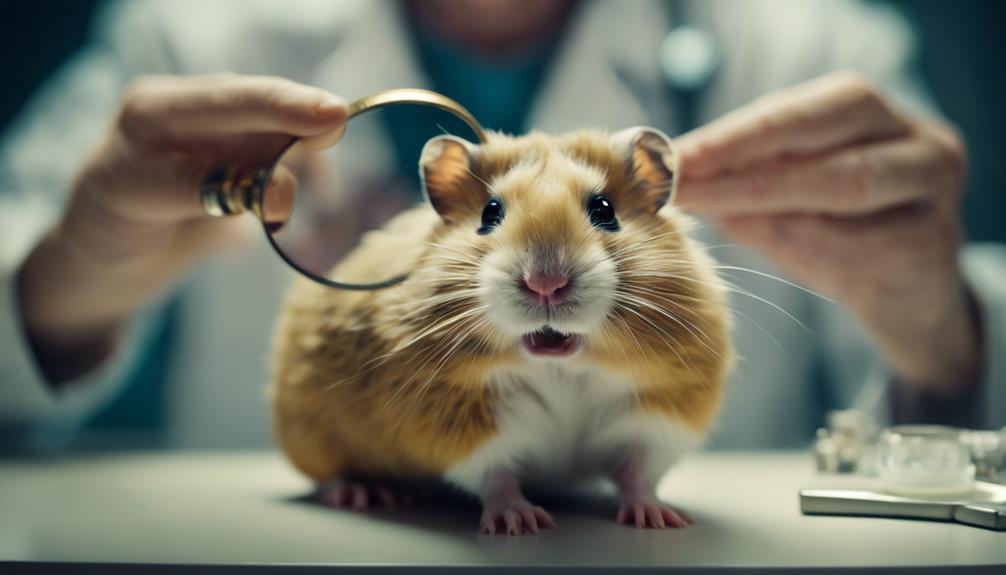
Monitoring the health of senior hamsters is paramount to ensuring their well-being in their later years. By conducting regular health check-ups and being vigilant for signs of aging, owners can address any issues promptly.
Preventive care measures, such as providing a balanced diet and creating a comfortable living environment, can contribute significantly to the overall health and happiness of senior hamsters.
Regular Health Check-Ups
Regular health check-ups are crucial for ensuring the well-being of senior hamsters. To support your furry friend in their golden years, remember these key practices:
- Dental Care: Regularly inspect your hamster's teeth for overgrowth or signs of dental issues. Provide appropriate chew toys to help maintain dental health.
- Grooming Routines: Keep an eye on your hamster's grooming habits. Assist with grooming if necessary, especially if they're struggling to groom themselves effectively.
- Weight Management: Monitor your hamster's weight regularly and adjust their diet as needed to prevent obesity or excessive weight loss.
- Hydration Needs: Ensure your hamster has access to fresh water at all times and monitor their water intake, as dehydration can be a common issue in senior hamsters.
Signs of Aging
As hamsters age, vigilant observation of their health becomes paramount, necessitating regular veterinary check-ups to address any emerging issues promptly. Caregiver responsibilities towards aging hamsters extend to recognizing subtle signs of aging, such as changes in activity levels, weight loss, dental problems, and fur loss.
Supporting senior hamsters involves creating a comfortable living environment that accommodates their changing needs, including softer bedding and easy access to food and water. It's crucial for caregivers to monitor their hamsters closely for any deviations from normal behavior and consult a veterinarian if they notice any concerning symptoms.
Regular vet visits are essential for early detection of age-related health issues, ensuring that senior hamsters receive the care they need to maintain their quality of life.
Preventive Care Measures
Upon acknowledging the signs of aging in senior hamsters, caregivers must prioritize preventive care measures, including vigilant health monitoring and regular veterinary visits to ensure their well-being.
- Regular Health Monitoring: Keep a close eye on your senior hamster's weight, activity levels, and appetite. Any changes could indicate underlying health issues.
- Senior Hamster Grooming: Help your hamster groom by gently brushing its fur to prevent matting, which can lead to skin problems.
- Dental Care for Seniors: Provide chew toys to help wear down their teeth, as dental issues are common in older hamsters.
- Routine Vet Visits: Schedule regular check-ups with a vet experienced in small animal care to catch any health concerns early on.
Emotional Support and Bonding
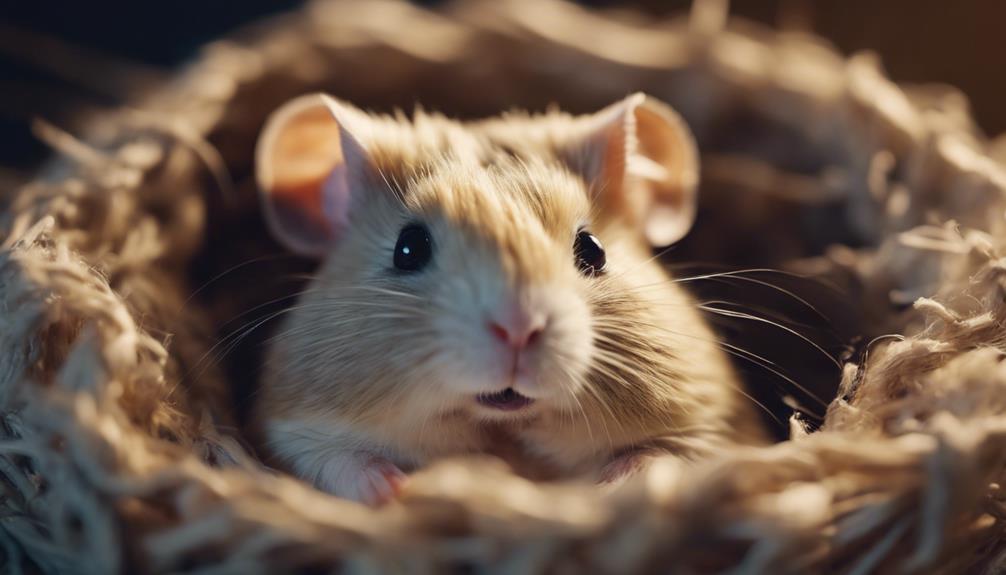
In establishing a deep emotional bond with senior hamsters, caregivers must demonstrate patience, consistency, and gentleness. Bonding activities play a crucial role in nurturing this emotional connection. Spending time with your senior hamster, talking to them softly, and offering treats can all contribute to building trust and strengthening your bond. It's essential to respect your hamster's individual personality and preferences, allowing them to set the pace for interactions.
Creating a safe and comfortable environment is also key to fostering emotional support. Providing a cozy nest, enriching their living space with toys and tunnels, and ensuring a balanced diet all contribute to your hamster's well-being and emotional health. By observing your hamster's body language and responding to their cues, you can deepen your understanding of their needs and strengthen your relationship.
Frequently Asked Questions
How Can I Help My Senior Hamster Maintain a Healthy Weight as They Age?
To help a senior hamster maintain a healthy weight, one can provide dietary supplements and introduce gentle exercise routines. Weight management is crucial, and mobility aids can support the hamster's active lifestyle in their golden years.
Are There Any Specific Grooming Tips for Senior Hamsters With Mobility Issues?
Navigating grooming for senior hamsters with mobility challenges requires finesse. Special diets aid in maintaining a healthy coat. Gentle handling, akin to a delicate dance, ensures comfort and cleanliness. Support and understanding are paramount in this delicate process.
Can Senior Hamsters Still Enjoy Interactive Toys and Puzzles for Mental Stimulation?
Senior hamsters can still enjoy interactive toys and puzzles, benefiting their cognitive abilities and mental health. These enrichment activities help keep their minds sharp and engaged, promoting overall well-being and happiness in aging hamsters.
What Are Some Common Health Issues That Senior Hamsters May Face and How Can I Prevent Them?
In the twilight of their days, senior hamsters may face health challenges. Regular veterinary checkups, tailored exercise routines, enriching activities, and dietary supplements can aid in prevention. A holistic approach ensures their well-being in their golden years.
Is It Normal for Senior Hamsters to Become More Vocal or Clingy as They Age?
As senior hamsters age, behavior changes may include increased vocalizations and clinginess. These are forms of communication seeking emotional support and companionship. Providing reassurance and spending quality time with them can help ease any anxieties they may have.









